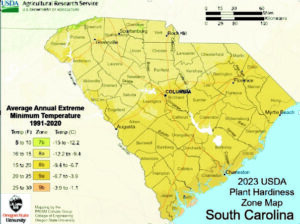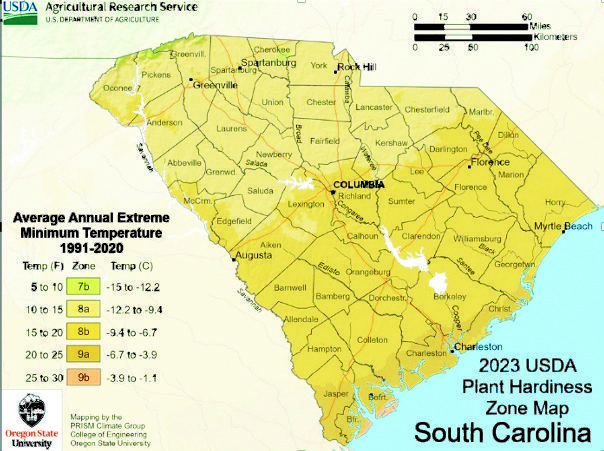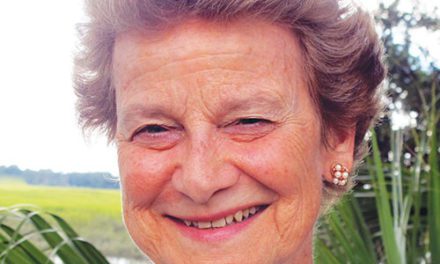 Beaufort County, South Carolina is now USDA Zone 9a.
Beaufort County, South Carolina is now USDA Zone 9a.
For decades, we were just plain old Zone 8. Then, when letter designations were added, we became 8b, even though our own senses told us that 8b was not quite warm enough.
Now in 2023, there are no more questions about our zone. We can’t be in the same zone as coastal Oregon and Washington anymore. They stayed 8b.
“What difference does it make?” you ask. Well, it makes a lot of difference to gardeners. We rely heavily on plant labels to tell us what plants we can buy. Sure, it’s only 5 degrees difference between 8b and 9a, but 5 degrees of temperature can mean life or death to a plant.
We must remember that the USDA maps rely only on days of cold weather. They don’t consider hot weather, which we must here in Beaufort, if our plants are to be successful. There are so many plants that need cold weather to give them the dormancy they require to bloom again the following year. That’s why we can’t grow some of our northern favorites such as delphiniums, tulips or peonies.
There is no longer any doubt that Climate Change will affect the way we garden and live. I used to think that I would wouldn’t need a winter wardrobe when I moved to South Carolina, but this past winter proved me wrong. Ear muffs and scarves became suitable Christmas gifts. And this past summer broke heat wave records all over the country. Air conditioning bills skyrocketed. Water bills did too, for those unlucky enough not to have a well to feed their thirsty plants.
What’s the most effective thing we can do to help address these issues? Mulch, mulch and more mulch. Mulch will help mitigate the extremes of weather. Hot or cold. It will moderate the soil temperature and help the roots stay alive even if the top growth succumbs to the weather. It improves the chances that your plant will return the following year.
Native plants? Sure. But even some native plants will struggle in a non-native environment, i.e. your backyard garden. In their native habitat, they are usually protected and surrounded by other native plants without regard for whether they will thrive in a garden setting or not. So it’s wise to do some homework before you introduce any untried plant into your garden. It will save a lot of heartbreak and money.
Toughen up your lawn. Make it work to reach down deep to get at the water. Don’t water it every day or you’ll have a spoiled child of a lawn that requires daily attention.
Remember The Godfather, where Vito Corleone was playing with his grandson in his tomato garden? He had white cotton awnings covering the plants from the direct sun. In New York yet! Imagine how helpful they would be in the blistering sun of the Lowcountry. Easily made from sheets fastened to stakes.
Think about replacing some of your heat tender plants with similar hardy plants. Many garden clubs and other horticultural organizations have yearly plant sales of
Beaufort grown plants. Keep your eyes open for notices. Both your pocketbook and your garden will thank you.
And think about seeds, the most inexpensive way of obtaining new plants; especially ones you won’t find as plants in stores. Bedtime reading of plant and seed catalogs will help you get through the coming winter.
Mama used to say “Your eyes are bigger than your stomach” at the dinner table. They’re also bigger than you have space for or time to care for when you’re browsing through catalogs.
So beware!








